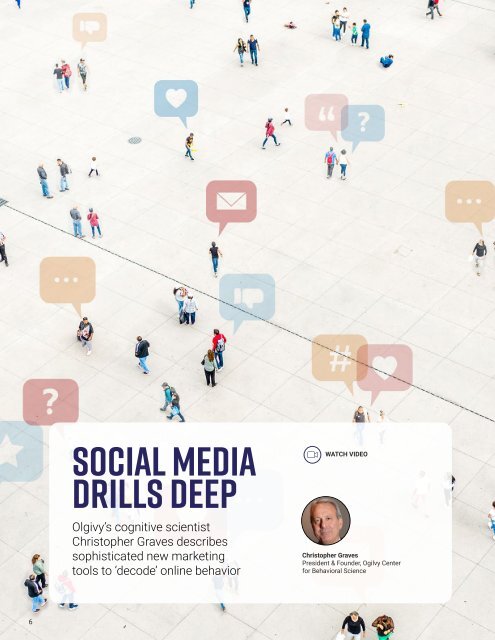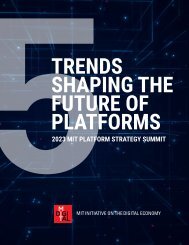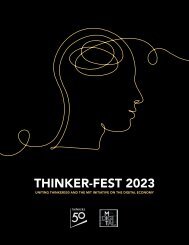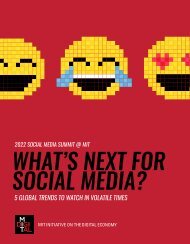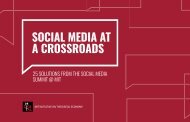The 2023 Social Media Summit@MIT Event Report
Create successful ePaper yourself
Turn your PDF publications into a flip-book with our unique Google optimized e-Paper software.
Christopher Graves, the keynote speaker at the <strong>2023</strong> <strong>Social</strong><br />
<strong>Media</strong> <strong>Summit@MIT</strong>, offered a revealing look under the hood<br />
of social media marketing tools. He described the growing<br />
danger of what he calls “personality-based marketing,” a<br />
rising—and somewhat disturbing—approach that matches<br />
individual personality traits to social media habits.<br />
How Behavioral Science<br />
Can Decode Us<br />
Graves knows more about digital marketing than most. <strong>The</strong><br />
founder and president of the Ogilvy Center for Behavioral<br />
Science, part of Ogilvy Consulting, he pointed out that<br />
companies are now correlating users’ online behavior—<br />
even photographs of their faces—with specific personality<br />
characteristics. Organizations then use these sophisticated<br />
results to build a data “genome” and deliver content aimed at<br />
encouraging specific actions.<br />
Personality Traits<br />
COGNITIVE STYLE<br />
People have a series of filters that either sharpen or distort<br />
their beliefs, preferences, and decisions, Graves told<br />
SMS@MIT attendees. “I can now test individuals at large<br />
scale to better ‘decode’ them,” he added.<br />
“When you use this for good, it could possibly lead to<br />
rapprochement or resonance,” Graves said. “But if you use<br />
it for ill will, it could be very malicious manipulation.”<br />
WORLDVIEW & AFFINITIES<br />
While marketing has long used personality-driven<br />
techniques to find, segment, and sell to customers,<br />
today’s AI-based approaches are far more sophisticated<br />
and accurate. Also, where earlier approaches attempted<br />
to change or convert ideas, today’s behavioral approaches<br />
focus on changing behavior.<br />
Graves said that personality inference can be done in six<br />
distinct ways, all of which can be accelerated with AI for<br />
pattern recognition: eye tracking, text parsing, images<br />
(especially photos of faces), music and sound, behavior<br />
on a mobile phone, and social engagement.<br />
SOCIAL MEDIA<br />
DRILLS DEEP<br />
Olgivy’s cognitive scientist<br />
Christopher Graves describes<br />
sophisticated new marketing<br />
tools to ‘decode’ online behavior<br />
WATCH VIDEO<br />
Christopher Graves<br />
President & Founder, Ogilvy Center<br />
for Behavioral Science<br />
“Companies have<br />
great interest in<br />
figuring out who you<br />
are based on your<br />
digital footprint.”<br />
Christopher Graves<br />
President & Founder, Ogilvy Center for Behavioral Science<br />
Graves described three lenses that marketers use to<br />
gain insights into individuals: personality traits, cognitive<br />
style, and worldview/identity. <strong>The</strong>se factors come into<br />
play when a social media platform—or a user or advertiser<br />
on a platform—wants to persuade others to take a specific<br />
action. People with different personalities, cognitive styles,<br />
and worldviews will respond better or worse to different<br />
kinds of messages.<br />
‘Decoding’ Personality Traits<br />
In the past, personality profiling was typically done with<br />
surveys and tests. But today’s social media platforms can<br />
remotely “decode” people by observing their preferences<br />
and behavior online.<br />
One approach claims to correlate personality types with eye<br />
movement; another purports to do the same through your<br />
use of language. Yet another technology claims to use a<br />
photograph of faces to determine personality types or even,<br />
according to one researcher, a person’s sexual orientation.<br />
It’s not clear whether this kind of tracking is being used<br />
now by the leading social media platforms, Graves said.<br />
But patent applications around personal inference have<br />
been filed by companies that include Facebook, Google,<br />
Microsoft, and Spotify. <strong>The</strong>se companies, Graves added,<br />
“have great interest in looking at your digital footprint and<br />
digital breadcrumbs to figure out who you really are—not<br />
who you say you are.”<br />
Getting to Know You<br />
<strong>The</strong>se analytics could also be used to empower AI chatbots<br />
for good purposes. For example, in the case of vaccine<br />
resistance, an empathetic approach might hear out the<br />
person’s reasons for concern and then match a pro-vaccine<br />
storyline to that person’s personality type.<br />
Another example: People could also opt-in to use personalityinferring<br />
chatbots to help them quit smoking. “If you know<br />
how somebody’s wired and respectfully approach them on<br />
their terms in ways that make sense to them, you probably<br />
have a slightly better chance at helping them,” Graves said.<br />
Despite the promise, personality-aware AI could make the<br />
spread of misinformation even more pernicious. “Imagine<br />
I’m trying to whip you up into anger, into further polarization,”<br />
Graves said. “I will have better tools and a much more finely<br />
nuanced understanding of your hot buttons.”<br />
6<br />
7


